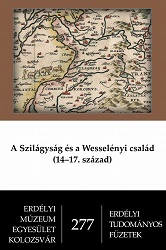A Borsa-tartomány igazgatásának kérdései
Questions Regarding the Administration of the Province of the Borsas.
Author(s): Attila Zsoldos
Subject(s): Local History / Microhistory
Published by: Erdélyi Múzeum-Egyesület
Summary/Abstract: The study analyzes a hitherto unexplored feature of the province of oligarchs Palatine Kopasz Borsa and his brother Beke (and their kinship), who controlled the largest part of Tiszántúl region in the decades around the turn of the 13th–14th century: the administration of their province. It is generally considered that the government of provinces based on oligarchic private power followed the particularities of two provinces founded by the rulers of the Kingdom of Hungary, Transylvania and Slavonia. By the mid-13th century, it had been a steady practice in Transylvania and Slavonia that the counts (comites) of the counties (comitates) were appointed by the voivode or the Ban ruling over the province, and the royal castles of the province were also headed by the voivode and the Ban. The same system could be observed in the oligarchic private provinces: the lord of the province appointed a vice-count – often called a count (“ispán”, comes) – among his familiares as the head of the counties under his rule, who in most cases demonstrably, and in other cases supposedly, was also a castellan of one of the lord’s castles. As usual in the time, the power of the count belonged to the oligarch, who however surprisingly rarely used these titles. The province of the Borsas was built on the same principle. At the same time, it was particularized by the fact of being the only oligarchic province in the age which was not under the indisputable rule of one single person but was jointly owned by the Borsas – the sons of count Tamás and their descendants. The study shows that the Borsas, similarly to the Kőszegis, the oligarchs of the western Dunántúl, shared their castles, except for those in Ugocea (Ugocsa) county, which was not an organic part of the province, and which were ruled as one of the brothers’, Beke’s own castles, who did not share them with the other Borsas. The province itself remained nonetheless under an integrated rule, although the sources at our disposal show signs of a serious conflict between Kopasz and Beke around 1307–1308. The family conflict, as it is clear in the light of later developments, led to no breakup, the Borsas seemed to have been able to overcome it, in contrast with the Kőszegis, whose enmity ended up in armed conflict. The province was ultimately disintegrated not by this conflict, but by the defeat by Charles I during the two revolts of the Borsas.
Book: A Szilágyság és a Wesselényi család (14–17. század)
- Page Range: 25-44
- Page Count: 20
- Publication Year: 2012
- Language: Hungarian
- Content File-PDF

